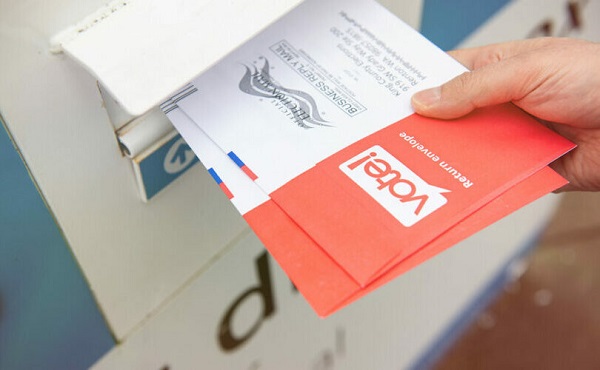International
Pennsylvania Supreme Court rules undated ballots won’t be counted in presidential election

From LifeSiteNews
Pennsylvania’s highest court did not, however, agree with Republicans that provisional ballots should not be granted to people whose original mail ballots were too flawed to be counted.
Mail ballots submitted without a date will not be counted in Pennsylvania after all, the state’s highest court ruled Friday after a lower court declared they should be accepted.
The Epoch Times reports that the Pennsylvania Supreme Court granted the Republican National Committee and Pennsylvania Republican Party’s emergency request for a stay of a appellate court ruling two days earlier that the “free and equal elections clause” of the Pennsylvania Constitution required the Philadelphia Board of Elections to count a set of undated envelopes in a September special election for a state House seat.
While those envelopes did not directly concern the 2024 presidential election, if the ruling stood it would have had major ramifications for the race between Republican former President Donald Trump and Democrat Vice President Kamala Harris. Therefore, the justices made clear that the appellate decision “shall not be applied to the November 5, 2024 General Election.”
The Pennsylvania Supreme Court’s election decisions have not all been favorable to Republicans, however; it previously ruled that Pennsylvania voters will be allowed to cast provisional ballots in the event of a problem with the mail ballots they already cast, and the U.S. Supreme Court declined to intervene Friday.
“The actual provisional ballots contain no identifying information, only a vote,” GOP attorneys argued, to no avail. “Once ballots are separated from their outer envelopes, there is no way to retroactively figure out which ballots were illegally cast. In other words, once the egg is scrambled, it cannot be unscrambled.”
Pennsylvania holds 19 electoral votes (down one from prior elections due to redistricting), and is believed by many to be a crucial swing state that could be enough to decide the election’s outcome. The RealClearPolitics polling average for the state places Trump in the lead at just 0.4 percent, while RaceToTheWH’s average has Harris ahead by a scant 0.3 percent. Trump won the state in 2016; outgoing Democrat President Joe Biden claimed it in 2020.
Election integrity has long been an issue in American politics, but the controversy significantly intensified when the 2020 presidential election was marked by widespread election irregularities and numerous allegations that the election had been rigged for Joe Biden against Donald Trump, bolstered by the dramatic expansion of voting by mail in the wake of COVID-19.
Twenty-eight states relaxed their mail ballot rules in 2020, contributing to a 17-million vote increase from 2016. In addition to mail ballots generally being less secure than in-person votes, four of those states – Georgia, Michigan, Pennsylvania, and Wisconsin – changed their rules without legislative consent. Those four alone comprised 56 of Biden’s electoral votes, more than enough to decide the victor.
At the same time, attempts to prove the election had been stolen were undermined by judges who dismissed some claims on process issues without ever considering their merits as well as flawed legal briefs by election challengers and dramatic examples of “smoking guns” that never panned out. Nevertheless, the controversy did lead to 14 states tightening their election rules over the following two years.
Daily Caller
AI Needs Natural Gas To Survive


From the Daily Caller News Foundation
By David Blackmon
As recent studies project a big rise in power generation demand from the big datacenters that are proliferating around the United States, the big question continues to focus in on what forms of generation will rise to meet the new demand. Most datacenters have plans to initially interconnect into local power grids, but the sheer magnitude of their energy needs threatens to outstrip the ability of grid managers to expand supply fast enough.
This hunger for more affordable, 24/7 baseload capacity is leading to a variety of proposed solutions, including President Donald Trump’s new executive orders focused on reviving the nation’s coal industry, scheduled to be signed Tuesday afternoon. But efforts to restart the permitting of new coal-fired power plants in the US will require additional policy changes, efforts which will take time and could ultimately fail. In the meantime, datacenter developers find themselves having to delay construction and completion dates until firm power supply can be secured.
Datacenters specific to AI technology require ever-increasing power loads. For instance, a single AI query can consume nearly ten times the power of a traditional internet search, and projections suggest that U.S. data center electricity consumption could double or even triple by 2030, rising from about 4-5% of total U.S. electricity today to as much as 9-12%. Globally, data centers could see usage climb from around 536 terawatt-hours (TWh) in 2025 to over 1,000 TWh by 2030. In January, a report from the American Security Project estimated that datacenters could consume about 12% of all U.S. power supply.
Obviously, the situation calls for innovative solutions. A pair of big players in the natural gas industry, Liberty Energy and Range Resources, announced on April 8 plans to diversify into the power generation business with the development of a major new natural gas power plant to be located in the Pittsburgh area. Partnering with Imperial Land Corporation (ILC), Liberty and Range will locate the major power generation plant in the Fort Cherry Development District, a Class A industrial park being developed by ILC.
“The strategic collaboration between Liberty, ILC, and Range will focus on a dedicated power generation facility tailored to meet the energy demands of data centers, industrial facilities, and other high-energy-use businesses in Pennsylvania,” the companies said in a joint release.
Plans for this new natural gas power project follows closely on the heels of the March 22 announcement for plans to transform the largest coal-fired power plant in Pennsylvania, the Homer City generating station, into a new gas-fired facility. The planned revitalized plant would house 7 natural gas turbines with a combined capacity of 4.5 GW, enough power 3 million homes.
Both the Homer City station and the Fort Cherry plant will use gas produced out of the Appalachia region’s massive Marcellus Shale formation, the most prolific gas basin in North America. But plans like these by gas companies to invest in their own products for power needs aren’t isolated to Pennsylvania.
In late January, big Permian Basin oil and gas producer Diamondback Energy told investors that it is seeking equity partners to develop a major gas-fired plan on its own acreage in the region. The facility would primarily supply electricity to data centers, which are expected to proliferate in Texas due to the AI boom, while also providing power for Diamondback’s own field operations. This dual-purpose approach could lower the company’s power costs and create a new revenue stream by selling excess electricity.
Prospects for expansion of gas generation in the U.S. received a big boost in January when GE Vernova announced plans for a $600 million expansion of its manufacturing capacity for gas turbines and other products in the U.S. GE Vernova is the main supplier of turbines for U.S. power generation needs. The company plans to build 37 gas power turbines in 2025, with a potential increase to over 70 by 2027, to meet rising energy demands.
The bottom line on these and other recent events is this: Natural gas is quickly becoming the power generation fuel of choice to feed the needs of the expanding datacenter industry through 2035, and potentially beyond. Given that reality, the smart thing to do for these and other companies in the natural gas business is to put down big bets on themselves.
David Blackmon is an energy writer and consultant based in Texas. He spent 40 years in the oil and gas business, where he specialized in public policy and communications.
International
Trump White House will ignore reporter emails that include ‘preferred pronouns’ in signature

From LifeSiteNews
“Any reporter who chooses to put their preferred pronouns in their bio clearly does not care about biological reality or truth and therefore cannot be trusted to write an honest story”
The White House will ignore all emails from reporters which include preferred gender pronouns in their email signatures according to Press Secretary Karoline Leavitt.
“Any reporter who chooses to put their preferred pronouns in their bio clearly does not care about biological reality or truth and therefore cannot be trusted to write an honest story,” Leavitt wrote in response to a request for comment from the New York Times.
The practice of citing one’s preferred gender pronouns, which is increasingly prevalent among leftists, stems from gender ideology, the idea that people have a “gender identity” that is distinct from their sex. Thus, for example, women who identify as males may include the gender pronouns “he/him” in their email signature or other identifiers.
Leavitt had previously stated to a NYT reporter who inquired about the potential closure of a climate research observatory, “As a matter of policy, we do not respond to reporters with pronouns in their bios.”
The New York Times reported that Katie Miller, senior advisor for the Department Of Government Efficiency (DOGE), had weeks prior declined another question from a Times reporter, for the same reason.
“As a matter of policy, I don’t respond to people who use pronouns in their signatures as it shows they ignore scientific realities and therefore ignore facts,” Miller said in an email. In a separate message, she noted, “This applies to all reporters who have pronouns in their signature.”
-

 Also Interesting2 days ago
Also Interesting2 days agoMortgage Mayhem: How Rising Interest Rates Are Squeezing Alberta Homeowners
-

 Alberta2 days ago
Alberta2 days agoAlberta takes big step towards shorter wait times and higher quality health care
-

 Business2 days ago
Business2 days agoStocks soar after Trump suspends tariffs
-

 Justice2 days ago
Justice2 days agoCanadian government sued for forcing women to share spaces with ‘transgender’ male prisoners
-

 COVID-192 days ago
COVID-192 days agoBiden Admin concealed report on earliest COVID cases from 2019
-

 COVID-192 days ago
COVID-192 days agoRandy Hillier wins appeal in Charter challenge to Covid lockdowns
-

 Business2 days ago
Business2 days agoTrump raises China tariffs to 125%, announces 90-day pause for countries who’ve reached out to negotiate
-

 Business2 days ago
Business2 days agoScott Bessent Says Trump’s Goal Was Always To Get Trading Partners To Table After Major Pause Announcement




